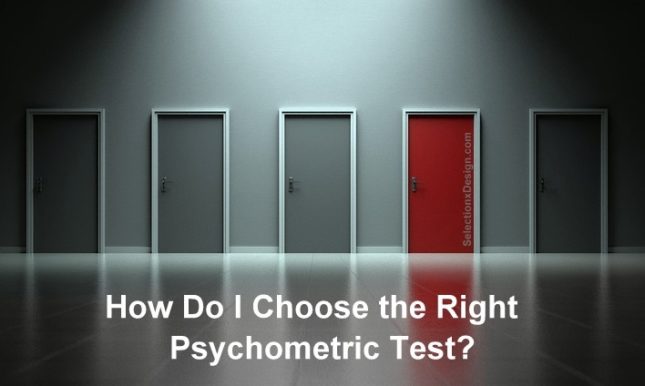
We are often asked how to choose a psychometric test by our clients, trainees and even qualified Test Users. Related questions include: What measure will best help me choose the right job candidates? Which assessments should I include for career counselling? How can I find a test to identify leadership potential?
Whatever your purpose for testing, deciding which assessments to use should be an informed, objective process of evaluation. Here are a few essential considerations to help you choose the right test.
How to Choose a Psychometric Test
- What abilities, traits or characteristics do you need to measure?
First, consider the kinds of tests that might be most useful for your particular situation. For example:
- For job selection, consider the kind of work the employee will need to do and be sure your test covers the skills, knowledge or qualities they need to succeed on the job. A job analysis, providing a systematic break-down of work components, is a good place to start.
- For personal coaching or professional development, you might take a broader approach in deciding which attributes to measure. Depending on the person’s stage of work-life, you might find it useful to include tests that explore career interests, preferences, motives or values. Personality assessment can also be very effective in revealing best-suited occupations.
- For professional, leadership or team development, more in-depth evaluation of strengths/weaknesses, emotional intelligence and interrelations among team members are good options. Examples include the 16pf®, Comprehensive Insights Report, Bar-On EQi Workplace Report, Dimension’s Team Profile Report, or Leadership Derailer Report.
- How will you administer the test?
Are paper and pencil or computerised assessments better suited to the purpose of testing? Should testing be directly supervised, or is remote assessment appropriate?
For high stakes decisions, supervised assessment should be included. Do you have the space and time to run testing under conditions of close supervision, or will you need to make arrangements for a testing centre? Assessment costs increase as administration becomes more controlled.
- What’s your budget?
What are you willing to pay for, and what can you afford? Prices vary widely among types of assessments and between test publishers. Computerised assessments are priced according to the nature, purpose and detail of the results report. The more in-depth, the higher the cost. With paper and pencil tests, you can often re-use question booklets so will need to replace just answer sheets.
- Is the test psychometrically sound?
Without getting too statistical here: Are you satisfied that the test will measure reliably? Are you convinced that it measures what it claims to? Is there any evidence that it will measure accurately? Is the test free from bias and fair to minority group members?
Look at the types of norm groups provided, and consider whether they are similar enough to your own client sample. If they are not, you risk misinterpreting test scores. This could mean overlooking a well-matched job applicant, or hiring one who will struggle.
- What kinds of feedback options are available?
Can test scores be shared through face-to-face feedback, or through written feedback reports? What level of guidance in interpreting results is provided by the publisher? Are you familiar enough with this measure to score and interpret it independently?
If you will be purchasing a written report of results, can you amend it to reflect additional information about the test taker? (Even with purchased, prepared reports, scores should be considered as “hypothetical” and in need of verification.) Are there options for summary scores if you need to assess a large number of persons at once?
If using a computerized test report, consider who the intended audience is. Are client or candidate reports available for the test, offering feedback that is appropriate in information depth, technicality and style of language?
You might also consider: Are there options for summary scores if you need to assess a large number of persons in a campaign?
- Ease of use?
How difficult is the test to administer? Does it come with clear instructions? Is it easy to score and interpret? Are feedback reports easy to follow?
- Are you qualified to access and work with the test?
Do you have the appropriate qualifications for the assessment you are interested in? (Educational, occupational, clinical or forensic, for example.) With more complex tests, such as personality measures, a publisher may require you to complete specialized training before you can work with a particular measure.
8. Where can I find information on all of the above?
You can always contact test publishers to request a catalogue of available tests. They are typically happy to offer advice and to answer any questions you might have about a specific measure. Some publisher websites offer extensive information on their products through their website.
The British Psychological Society (BPS) maintains a database of Test Reviews. Anyone can access review summaries, or purchase full test reviews. Once you have your Test User qualifications and sign up to the BPS Register of Qualified Test Users, you can access full test reviews for free to help you choose a psychometric test.
The BPS has a directory of Test Publishers and Test Distributors on their website. This is a great starting point for exploring different types of tests and suppliers.
And as always, feel free to contact us if you could use some guidance on how to choose a psychometric test.
Happy Testing!

